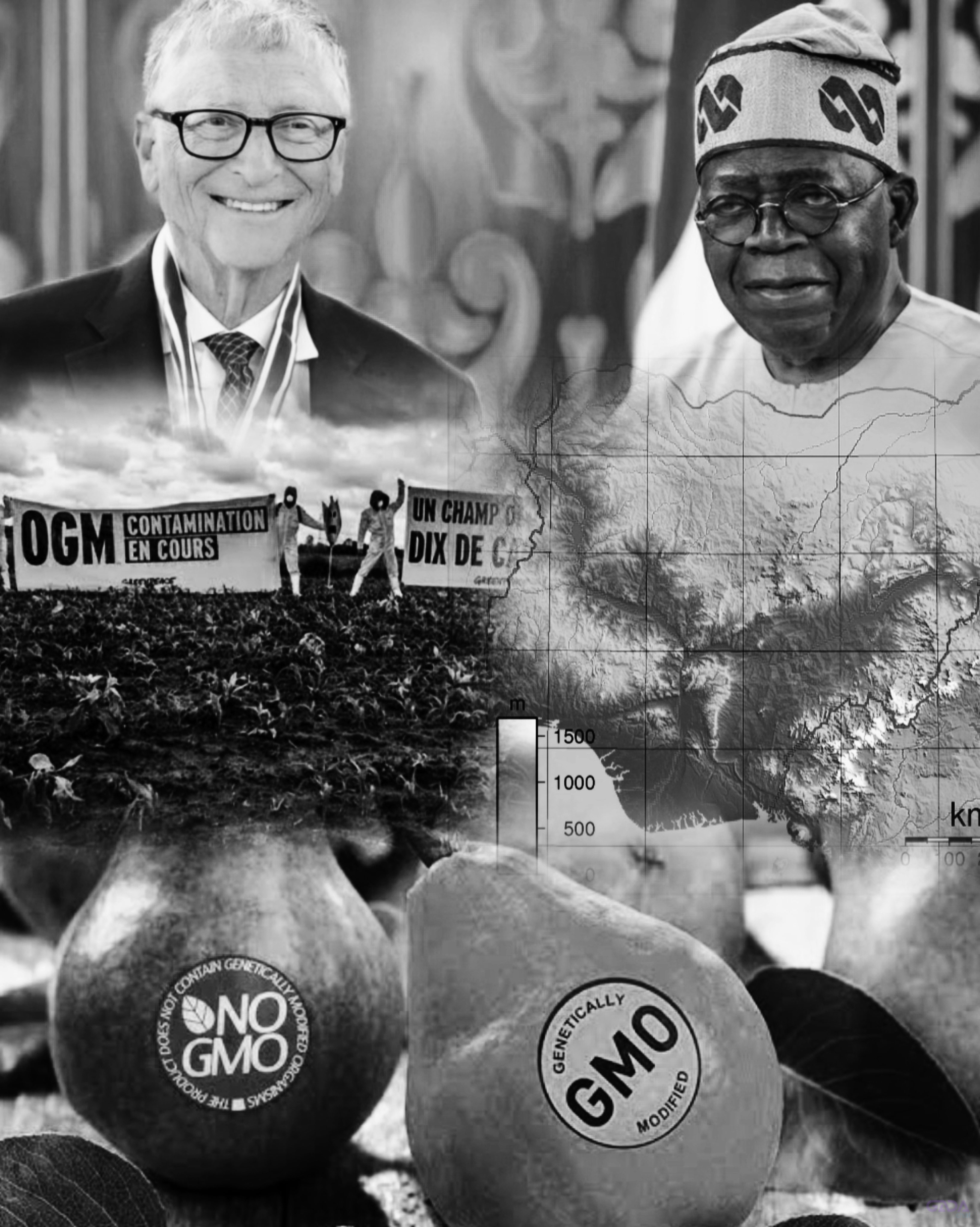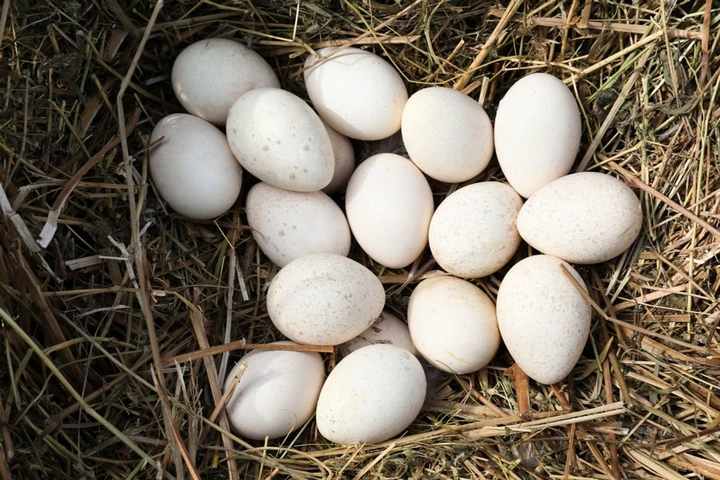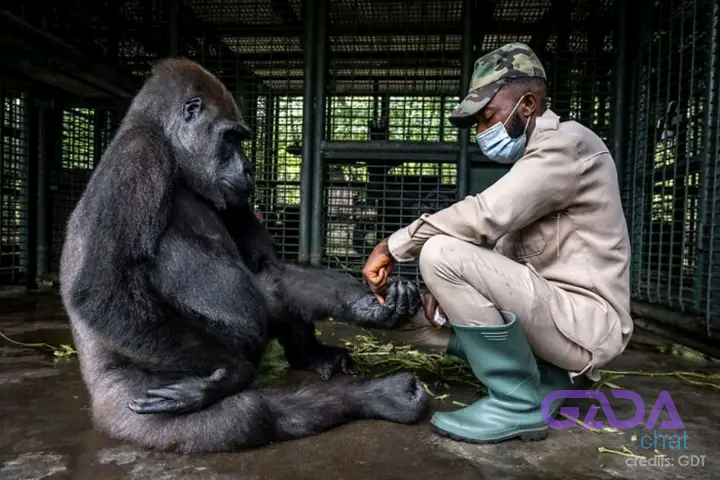Dear Nigerians,
Please do not joke with this warning. Read & share widely. This is not about politics. Tinubu's relentless foreign aid threatens to plunge Nigeria into its darkest era yet, a pit from which recovery may be impossible.
GMOs will **** us all!!
Around June 2024, the Federal Government of Nigeria quietly launched the TELA Maize Variety, a genetically modified organism (GMO) seed allegedly designed to boost maize production in the country, with little to no publicity.
The TELA Maize was developed at the Institute of Agricultural Research (IAR) at Ahmadu Bello University, Zaria, in collaboration with the African Agriculture Technology Foundation (AATF), which is funded by the Bill and Melinda Gates Foundation.
GMOs, or Genetically Modified Organisms, are plants, animals, or microorganisms whose genetic material has been altered using genetic engineering techniques.
Scientists isolate specific genes from one organism and insert them into another to transfer desired traits.
For example, scientists can insert genes from a bacterium that naturally produces insect-killing proteins into a crop plant. This modification helps the plant resist pests without requiring chemical insecticides.
How will it affect Nigeria?
GMOs are like seeds with superpowers; they can harm other living things, such as:
- Bees, birds, and butterflies that interact with the plants
- Animals like cows, horses, and goats that eat the plants
- Nearby plants that grow alongside GMO crops
The use of herbicide-resistant GMOs can trigger dangerous ecological changes in Nigeria. One major risk is the rise of herbicide-resistant weeds, which thrive despite chemical control. This disrupts balance in our ecosystem and build a chain reaction and that's just the beginning
If bees are harmed, they can't help natural plants grow by spreading pollen. That means animals depending on those plants for food or shelter start to suffer. With their habitats shrinking, they migrate or die off. We could see huge wildlife extinction within a few decades.
Health implications:
Introducing genes from one food into another can trigger new allergens or unknown effects in the human body. The long-term health impact of GMO foods is still unclear. It’s like being used for experiments without your consent.
Just like a fucking Lab rat
GMOs have been linked to cancers, allergies, and other health issues partly due to their reliance on toxic pesticides. By harming biodiversity and reducing nutritional diversity, they pose serious risks to both human health and the environment.
There has been growing speculation around GMOs in Africa, especially with figures like Bill Gates involved. Many see it as more than just control over Nigeria’s food system; it raises fears of long-term harm to public health and population through toxic, life-altering food.
Let’s talk about the economic implications: What is a patent? A patent is the sole right to exclude others from making, using, or selling an invention. In this context, it means Nigeria can only buy seeds from Bill Gates.
From our laws too
“Patents and Designs Act Cap 344,”
GMO seeds are often patented, meaning a few foreign companies control the seed supply, forcing farmers to buy new seeds every season at higher costs. The result? Farmer dependency, and loss of control over Nigeria’s agriculture & food security to a foreigner, Be worried.
Just like our oil was patented, so Nigeria must rely on a few foreign companies to refine it, and we’re seeing the same with our farmlands. GMO patents threaten our food security, leaving food production in the hands of outsiders. Same trap, different sector.
GMO seeds are made to resist pests and herbicides. But once planted, they lead to super-strong weeds that won’t die even after spraying herbicides. These “superweeds” are a tough, lasting problem for farmers and the environment.
They become herbicide-resistant weeds, plants that survive even after weedkiller sprays. When weeds face the same herbicide over and over, they adapt and build resistance, making them harder to control; they keep spreading, threatening crops and ecosystems.
When herbicide-resistant weeds take over farmland, they kill any non-GMO crops planted. This forces Nigerian farmers or the Nigerian state to rely only on patented GMO seeds controlled by foreign companies like those linked to Bill Gates or risk losing their harvest and going hungry.
Control over our food supply gives these companies huge power, potentially swaying government decisions just to keep access to GMO seeds. “He who controls a nation’s food chain controls the nation.” This could put Nigeria completely in their pocket.
The biggest issue? Market transparency. GMO seed monopolies often hide or don’t label their products, so farmers can’t make informed choices. The Nigerian government already gave them the go-ahead to enter our market. This means many will end up unknowingly buying and planting GMOs
Please do not joke with this warning. Read & share widely. This is not about politics. Tinubu's relentless foreign aid threatens to plunge Nigeria into its darkest era yet, a pit from which recovery may be impossible.
GMOs will **** us all!!
Around June 2024, the Federal Government of Nigeria quietly launched the TELA Maize Variety, a genetically modified organism (GMO) seed allegedly designed to boost maize production in the country, with little to no publicity.
The TELA Maize was developed at the Institute of Agricultural Research (IAR) at Ahmadu Bello University, Zaria, in collaboration with the African Agriculture Technology Foundation (AATF), which is funded by the Bill and Melinda Gates Foundation.
GMOs, or Genetically Modified Organisms, are plants, animals, or microorganisms whose genetic material has been altered using genetic engineering techniques.
Scientists isolate specific genes from one organism and insert them into another to transfer desired traits.
For example, scientists can insert genes from a bacterium that naturally produces insect-killing proteins into a crop plant. This modification helps the plant resist pests without requiring chemical insecticides.
How will it affect Nigeria?
GMOs are like seeds with superpowers; they can harm other living things, such as:
- Bees, birds, and butterflies that interact with the plants
- Animals like cows, horses, and goats that eat the plants
- Nearby plants that grow alongside GMO crops
The use of herbicide-resistant GMOs can trigger dangerous ecological changes in Nigeria. One major risk is the rise of herbicide-resistant weeds, which thrive despite chemical control. This disrupts balance in our ecosystem and build a chain reaction and that's just the beginning
If bees are harmed, they can't help natural plants grow by spreading pollen. That means animals depending on those plants for food or shelter start to suffer. With their habitats shrinking, they migrate or die off. We could see huge wildlife extinction within a few decades.
Health implications:
Introducing genes from one food into another can trigger new allergens or unknown effects in the human body. The long-term health impact of GMO foods is still unclear. It’s like being used for experiments without your consent.
Just like a fucking Lab rat
GMOs have been linked to cancers, allergies, and other health issues partly due to their reliance on toxic pesticides. By harming biodiversity and reducing nutritional diversity, they pose serious risks to both human health and the environment.
There has been growing speculation around GMOs in Africa, especially with figures like Bill Gates involved. Many see it as more than just control over Nigeria’s food system; it raises fears of long-term harm to public health and population through toxic, life-altering food.
Let’s talk about the economic implications: What is a patent? A patent is the sole right to exclude others from making, using, or selling an invention. In this context, it means Nigeria can only buy seeds from Bill Gates.
From our laws too
“Patents and Designs Act Cap 344,”
GMO seeds are often patented, meaning a few foreign companies control the seed supply, forcing farmers to buy new seeds every season at higher costs. The result? Farmer dependency, and loss of control over Nigeria’s agriculture & food security to a foreigner, Be worried.
Just like our oil was patented, so Nigeria must rely on a few foreign companies to refine it, and we’re seeing the same with our farmlands. GMO patents threaten our food security, leaving food production in the hands of outsiders. Same trap, different sector.
GMO seeds are made to resist pests and herbicides. But once planted, they lead to super-strong weeds that won’t die even after spraying herbicides. These “superweeds” are a tough, lasting problem for farmers and the environment.
They become herbicide-resistant weeds, plants that survive even after weedkiller sprays. When weeds face the same herbicide over and over, they adapt and build resistance, making them harder to control; they keep spreading, threatening crops and ecosystems.
When herbicide-resistant weeds take over farmland, they kill any non-GMO crops planted. This forces Nigerian farmers or the Nigerian state to rely only on patented GMO seeds controlled by foreign companies like those linked to Bill Gates or risk losing their harvest and going hungry.
Control over our food supply gives these companies huge power, potentially swaying government decisions just to keep access to GMO seeds. “He who controls a nation’s food chain controls the nation.” This could put Nigeria completely in their pocket.
The biggest issue? Market transparency. GMO seed monopolies often hide or don’t label their products, so farmers can’t make informed choices. The Nigerian government already gave them the go-ahead to enter our market. This means many will end up unknowingly buying and planting GMOs
Dear Nigerians, ‼️
Please do not joke with this warning. Read & share widely. This is not about politics. Tinubu's relentless foreign aid threatens to plunge Nigeria into its darkest era yet, a pit from which recovery may be impossible.
GMOs will fuck us all!!
Around June 2024, the Federal Government of Nigeria quietly launched the TELA Maize Variety, a genetically modified organism (GMO) seed allegedly designed to boost maize production in the country, with little to no publicity.
The TELA Maize was developed at the Institute of Agricultural Research (IAR) at Ahmadu Bello University, Zaria, in collaboration with the African Agriculture Technology Foundation (AATF), which is funded by the Bill and Melinda Gates Foundation.
GMOs, or Genetically Modified Organisms, are plants, animals, or microorganisms whose genetic material has been altered using genetic engineering techniques.
Scientists isolate specific genes from one organism and insert them into another to transfer desired traits.
For example, scientists can insert genes from a bacterium that naturally produces insect-killing proteins into a crop plant. This modification helps the plant resist pests without requiring chemical insecticides.
How will it affect Nigeria?
GMOs are like seeds with superpowers; they can harm other living things, such as:
- Bees, birds, and butterflies that interact with the plants
- Animals like cows, horses, and goats that eat the plants
- Nearby plants that grow alongside GMO crops
The use of herbicide-resistant GMOs can trigger dangerous ecological changes in Nigeria. One major risk is the rise of herbicide-resistant weeds, which thrive despite chemical control. This disrupts balance in our ecosystem and build a chain reaction and that's just the beginning
If bees are harmed, they can't help natural plants grow by spreading pollen. That means animals depending on those plants for food or shelter start to suffer. With their habitats shrinking, they migrate or die off. We could see huge wildlife extinction within a few decades.
Health implications:
Introducing genes from one food into another can trigger new allergens or unknown effects in the human body. The long-term health impact of GMO foods is still unclear. It’s like being used for experiments without your consent.
Just like a fucking Lab rat
GMOs have been linked to cancers, allergies, and other health issues partly due to their reliance on toxic pesticides. By harming biodiversity and reducing nutritional diversity, they pose serious risks to both human health and the environment.
There has been growing speculation around GMOs in Africa, especially with figures like Bill Gates involved. Many see it as more than just control over Nigeria’s food system; it raises fears of long-term harm to public health and population through toxic, life-altering food.
Let’s talk about the economic implications: What is a patent? A patent is the sole right to exclude others from making, using, or selling an invention. In this context, it means Nigeria can only buy seeds from Bill Gates.
From our laws too
“Patents and Designs Act Cap 344,”
GMO seeds are often patented, meaning a few foreign companies control the seed supply, forcing farmers to buy new seeds every season at higher costs. The result? Farmer dependency, and loss of control over Nigeria’s agriculture & food security to a foreigner, Be worried.
Just like our oil was patented, so Nigeria must rely on a few foreign companies to refine it, and we’re seeing the same with our farmlands. GMO patents threaten our food security, leaving food production in the hands of outsiders. Same trap, different sector.
GMO seeds are made to resist pests and herbicides. But once planted, they lead to super-strong weeds that won’t die even after spraying herbicides. These “superweeds” are a tough, lasting problem for farmers and the environment.
They become herbicide-resistant weeds, plants that survive even after weedkiller sprays. When weeds face the same herbicide over and over, they adapt and build resistance, making them harder to control; they keep spreading, threatening crops and ecosystems.
When herbicide-resistant weeds take over farmland, they kill any non-GMO crops planted. This forces Nigerian farmers or the Nigerian state to rely only on patented GMO seeds controlled by foreign companies like those linked to Bill Gates or risk losing their harvest and going hungry.
Control over our food supply gives these companies huge power, potentially swaying government decisions just to keep access to GMO seeds. “He who controls a nation’s food chain controls the nation.” This could put Nigeria completely in their pocket.
The biggest issue? Market transparency. GMO seed monopolies often hide or don’t label their products, so farmers can’t make informed choices. The Nigerian government already gave them the go-ahead to enter our market. This means many will end up unknowingly buying and planting GMOs













